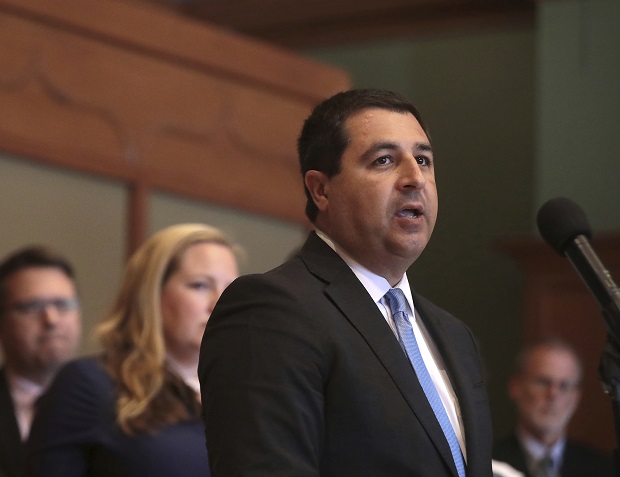Justices ponder if inherited IRAs get bankruptcy shield
By: KIMBERLY ATKINS, BridgeTower Media Newswires//March 25, 2014//
Justices ponder if inherited IRAs get bankruptcy shield
By: KIMBERLY ATKINS, BridgeTower Media Newswires//March 25, 2014//
 Washington — In a case that turns on the definition of two words in the expansive language of the Bankruptcy Code, the justices of the U.S. Supreme Court tried to determine whether an inherited retirement account can be shielded from bankruptcy liquidation.
Washington — In a case that turns on the definition of two words in the expansive language of the Bankruptcy Code, the justices of the U.S. Supreme Court tried to determine whether an inherited retirement account can be shielded from bankruptcy liquidation.
Arguments Monday in Clark v. Rameker, No. 13-299, presented a classic case of statutory interpretation, but with one twist: the court must decide if the law means what it says, or what is seems like lawmakers meant for it to say.
“All we have is the statute on one hand, and common sense on the other,” Justice Anthony Kennedy said.
The case involves a joint Chapter 7 bankruptcy filing by a married couple who sought to prevent an individual retirement account worth about $300,000 from being included among their liquid assets that could be used to pay creditors. The couple did not open or fund the account themselves — they inherited it when the wife’s mother passed away.
They cited §552 of the Bankruptcy Code, which exempts “retirement funds to the extent that those funds are in a fund or account that is exempt from taxation” under the Internal Revenue Code.
But the bankruptcy trustee objected, arguing that the exemption was meant only for IRA accounts that are opened by the debtor for the purpose of being used after retirement, not inherited accounts that can be drawn from before the debtor retires.
The bankruptcy court ruled in the trustee’s favor and denied the exemption. A federal district court overturned that ruling, finding that the plain language of the statute covers both retirement accounts that are inherited and those that are opened by the debtor.
But the 7th U.S. Court of Appeals reversed, holding that it was the wife’s mother and not one of the debtors who would have been entitled to a bankruptcy exemption for the funds. Since the retirement account was not opened for the debtors’ retirement and the funds could be used before their retirement, the IRA did not qualify for the bankruptcy exemption.
The ruling created a split in the circuits, and the Supreme Court took up the case.
Defining ‘retirement funds’
Arguments focused on the definition of “retirement funds” in the statute.
The bankruptcy filers, represented at the court by Kannon Shanmugam, a partner in the Washington office of Williams & Connolly LLP, argued that the words mean just what they say. Nothing in the statute suggests that inherited accounts should be treated any differently, he argued.
“[The trustee] asks this Court to exclude inherited IRAs by engrafting an additional limitation on to the statute,” Shanmugam said.
Justice Samuel Alito Jr. wondered if a ruling for the debtors would flout the purpose of the statute.
“Why would Congress provide this treatment for retirement funds? Because it doesn’t want debtors to be completely without means of supporting themselves after they reach retirement age,” Alito said. In this case, “it’s all going be withdrawn immediately [or at least] long before retirement is reached.”
Shanmugam said the funds will more likely be drawn down slowly, and therefore the amount remaining in the account would need the same protection as an account opened by the debtor.
But Justice Elena Kagan still seemed skeptical.
“At the very least it’s a one-way ratchet,” she said. “You cannot add to these funds.”
Danielle Spinelli, a partner in the Washington office of WilmerHale, argued on the trustee’s behalf that the debtors are offering the wrong definition of “retirement funds.”
“Retirement funds are funds set aside for the day when an individual stops working,” Spinelli said. “Funds in an inherited IRA do not meet that definition.”
Justice Stephen Breyer pointed out that in most of the paragraphs preceding the language at issue, the Code refers specifically to the debtor’s assets, but “then we see ‘retirement funds’” with no mention of the debtor.
Spinelli said that even if such distinction were made, it doesn’t make a difference because “only the debtor’s interest in property can come into the bankruptcy estate in the first place.”
Breyer expressed exasperation.
“There is no easy answer, one way or the other, because this is a case where common sense, frankly in my case, doesn’t get me anywhere,” he said.
A decision is expected later this term.
Legal News
- Steven Avery prosecutor Ken Kratz admits ‘mistakes were made’
- Colombian national extradited to Milwaukee faces International narcotics-trafficking conspiracy charge
- MPD: Milwaukee homicides down nearly 40 percent compared to last year
- EVERS: Republican lawmakers No-Show at special meeting to release statewide PFAS funding, stabilize healthcare access
- Wisconsin ICAC Task Force conference on Missing and Exploited Children highlights increase in sextortion cases
- More than 300 Wisconsin officers back in law enforcement after being fired or forced out
- Former Trump staffer who said to ‘fan the flame’ after 2020 loss hired to lead Wisconsin GOP
- Gov. Evers appoints David Casey to Serve as DOR Secretary
- Former Marine sentenced for Molotov Cocktail attack against Planned Parenthood Clinic
- ABA names 34th Annual Margaret Brent Women Lawyers of Achievement Awards honorees
- FBI launches criminal investigation into Key Bridge collapse
- Man charged in slaying after woman’s leg found at Milwaukee-area park
WLJ People
- Power 30 Personal Injury Attorneys – Russell Nicolet
- Power 30 Personal Injury Attorneys – Benjamin Nicolet
- Power 30 Personal Injury Attorneys – Dustin T. Woehl
- Power 30 Personal Injury Attorneys – Katherine Metzger
- Power 30 Personal Injury Attorneys – Joseph Ryan
- Power 30 Personal Injury Attorneys – James M. Ryan
- Power 30 Personal Injury Attorneys – Dana Wachs
- Power 30 Personal Injury Attorneys – Mark L. Thomsen
- Power 30 Personal Injury Attorneys – Matthew Lein
- Power 30 Personal Injury Attorneys – Jeffrey A. Pitman
- Power 30 Personal Injury Attorneys – William Pemberton
- Power 30 Personal Injury Attorneys – Howard S. Sicula











